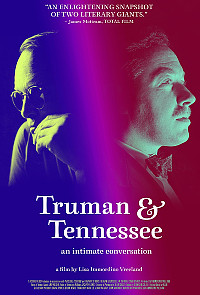| SHADOWS ON THE WALL | REVIEWS | NEWS | FESTIVAL | AWARDS | Q&A | ABOUT | TALKBACK | |||||||||||||
 Shadows off the beaten path Shadows off the beaten pathIndies, foreign, docs and shorts...
On this page:
HOUSE OF CARDIN |
SOME KIND OF HEAVEN |
TRUMAN & TENNESSEE
| |||||||||||||
| See also: SHADOWS FILM FESTIVAL | Last update 9.May.21 | |||||||||||||
|
House of Cardin Review by Rich Cline | 
| |||||||||||||
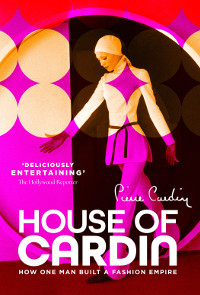 dir P David Ebersole, Todd Hughes prd Cori Coppola, P David Ebersole, Todd Hughes with Pierre Cardin, Jean-Paul Gaultier, Philippe Starck, Naomi Campbell, Sharon Stone, Jean-Michel Jarre, Alice Cooper, Dionne Warwick, Kenzo Takada, Hanae Mori, Guo Pei, Jenny Shimizu, Trina Turk release US 28.Aug.20, UK 30.Apr.21 19/US 1h37 VENICE FILM FEST Now streaming... |
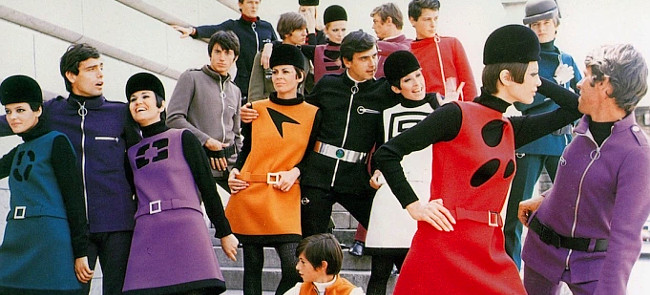 The relentlessly chic designer gets glowing tribute treatment in this colourful, fast-paced documentary, which premiered more than a year before his death in December 2020. A global icon, Pierre Cardin took a modern, architectural approach to fashion that had an impact far beyond the catwalks. Densely assembled without much space to breathe, this film centres uncritically on his career and legacy, only briefly dipping into what made him tick. With a flurry of glamorous photos and clips from the past seven decades, plus extensive interview footage, the film traces Cardin's life from his birth in 1922 Italy, moving to France during the war and studying to be a tailor, then making costumes for Cocteau's films and working at Dior before founding his own house in 1950. As he took the world by storm, wholeheartedly embracing futurism, his structural approach revolutionised the design of not just clothing, but also eyewear, furniture, fragrance and of course corporate branding. Filmmakers Eversole and Hughes interview Cardin himself and dozens of people who worked with or were inspired by him. Many were hired by him as young people and went on to develop their own now iconic houses. He generously supported designers and artists, and his global approach was groundbreaking, both reflecting and transcending culture. There are also glimpses of his lively wit and stubborn genius, learning from mistakes but unbending in his decision-making. Later on, the film touches on his relationships with Jeanne Moreau and long-term partner Andre Oliver. Cardin famously deconstructed classical fashions. And there are intriguing segments exploring his innovative shift from artful couture to a ready-to-wear approach: making his clothes accessible to the masses. Having been a model himself, he pioneered the idea of menswear fashion shows, and he was one of the first designers to put diverse models on his catwalks. He was also the first to work on a global scale, gathering inspiration and inspiring designers while opening up previously closed-culture countries like Japan, China and Russia to the Western world. The incessant chatter of the interviews runs over everything, never allowing us to take in the artistry on display, especially when subtitles are required for the multi-lingual interviews. This filmmaking approach provides the maximum information but seems to miss the point, only occasionally allowing Cardin's design and influence to speak for themselves. And the film would have had a much stronger kick with less fawning and an earthier look at who he was outside the limelight.
| ||||||||||||
|
Some Kind of Heaven Review by Rich Cline | 
| |||||||||||||
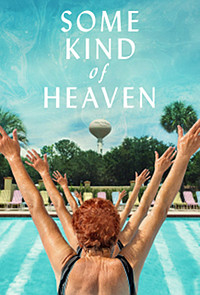 dir Lance Oppenheim prd Darren Aronofsky, Jeffrey Soros, Simon Horsman, Kathleen Lingo, Melissa Oppenheim Lano, Pacho Velez, Lance Oppenheim with Anne Kincer, Reggie Kincer, Barbara Lochiatto, Dennis Dean, Gary Schwartz, Lynn Henry, Weldon DeMeurers, Pinky O'Neill, Norman Lee Schaffer, Joe Herold, Carol Marks, Archie Carden release US 30.Apr.21, UK 14.May.21 20/US 1h23 SUNDANCE FILM FEST Now streaming... |
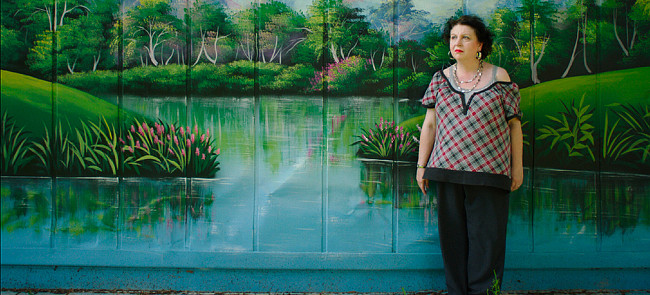 A fascinating portrait of life in America's largest retirement community, this warm and wryly funny documentary is packed with amazing sequences depicting older people fully living their lives in a place that looks like Disney World for pensioners. It's a beautifully shot and edited documentary, assembled with a knowing, observant eye by Lance Oppenheim. And as it continues, the humour gently gives way to moving emotional honesty. At The Villages in Florida, residents enjoy an active, busy lifestyle promising everything they could possibly need and none of the problems outside the gates. The film hones in on four residents who speak about how living here makes them feel younger, especially for the 20,000 of them who are single. Anne says the possibility of reinvention is like going to university. By contrast, the widowed Barbara feels trapped, as she no longer has the savings that would allow her to move back home. But maybe she can find a new kind of happiness here. Son of the founder, Gary explains that the community was designed to look like a vintage town with its own made-up history, targeting villagers who think they've found the fountain of youth. Today the population is 130,000, and living here initially feels like being on vacation every day. Except that they know nothing is real. The exhaustive range of activities and courses keeps them busy. And there's always the chance to meet someone new, develop a skill or perhaps change life entirely. The wide range of clubs and activities are depicted in colourfully witty tableaux, accompanied by observations that continually dig under the surface. For example, outsider Dennis loves being able to party with live music every day of the week while illicitly living in his van as he seeks a wealthy wife. Increasingly fearless due to dementia, Reggie loves tripping on drugs, which worries his tenaciously loyal wife Anne. Amid the amusing shots of sparky retirees indulging in wacky activities, far more sobering sequences reveal the gnawing sense that life has come to a dead end, even though they still have plenty of energy left. Each of the film's four central interviewees has his or her own specific journey, with a proper narrative arc that's involving, surprising and revelatory. This is a striking exploration of how each of us has to make decisions and compromises about life, and we will only be happy if we can live with the consequences.
| ||||||||||||
|
Truman & Tennessee: An Intimate Conversation Review by Rich Cline | 
Now streaming...
| 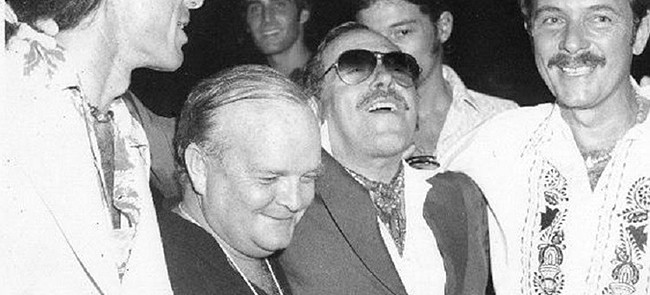 Described as "an encounter between lifelong friends in their own words", this documentary explores the connection between iconic writers Truman Capote and Tennessee Williams. Gifted documentarian Lisa Immordino Vreeland crafts a double biopic that juxtaposes them, infused with their witty words and huge personalities. And the ideas they shared add some superb resonance, tapping into the powerful interplay between them and drawing the viewer into the dialog. As they found acclaim and success in the mid-40s, Truman and Tennessee started a firm friendship that lasted four decades, including periods spent living abroad and going on holidays together with their partners, all while enjoying their professional rivalry. As they created now-classic characters and stories, they became celebrities themselves on New York's social scene, getting up to some lively antics with fellow writer Gore Vidal. Each man also had dark, inactive periods fuelled by alcoholism and both professional and personal issues. They died due to addiction issues within 18 months of each other. Parsons and Quinto voice these iconic men, respectively, speaking their words in their distinctively contrasting voices. These are edited to offer parallel observations about their work and pointed discussions of the themes they tackled. Interspersed with this are interview footage of both writers chatting on talk shows, plus snapshots and home movies, plus clips from film adaptations of their work, revealing the origins of indelible characters like Holly Golightly (Breakfast at Tiffany's) and Blanche DuBois (A Streetcar Named Desire). Vreeland takes a deep dive into their sexuality, using their own words to reveal how they felt about being gay at a time when it was illegal or immoral. They speak about the joys and lingering pain of one-night stands, as well as finding more lasting love. And they worked these thoughts into their work in cleverly subversive ways, so it was frustrating that film censors continually defanged their storylines. "I don't write for history," Tennessee said. "I write to express myself now." Or as Truman put it, "All writing is an act of faith and therefore an act of love." A common theme in their novels, plays and films is the yearning desire to love and be loved, which anyone can identify with. But of course as gay men in a repressive time, they were reflecting deeper ideas. Their discussions about the creative process are fascinating, while comments about loneliness, superstitions and phobias are moving. And as it explores the way they both took on enormous topics, the film brings its beautifully constructed narrative to a remarkably revealing climax.
| 
See also: SHADOWS FILM FESTIVAL © 2021 by Rich Cline, Shadows
on the Wall
HOME | REVIEWS | NEWS | FESTIVAL | AWARDS
| Q&A | ABOUT | TALKBACK | | ||||||||||


